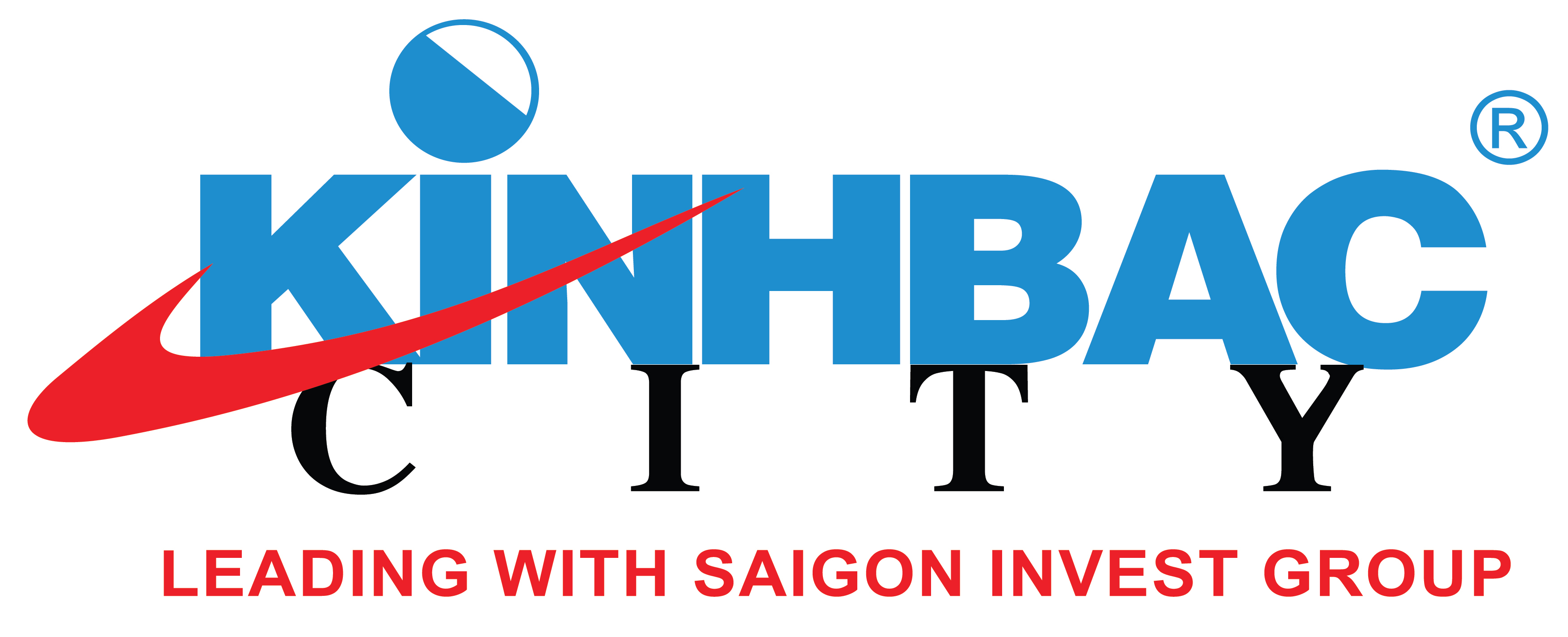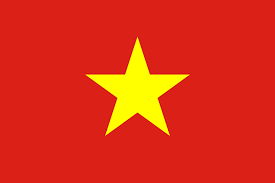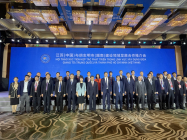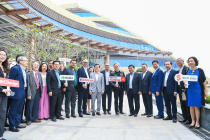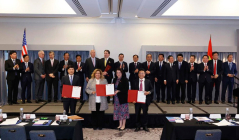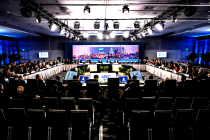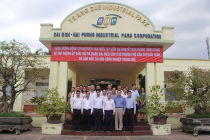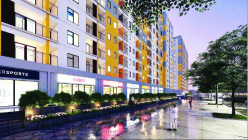A chance in a million years
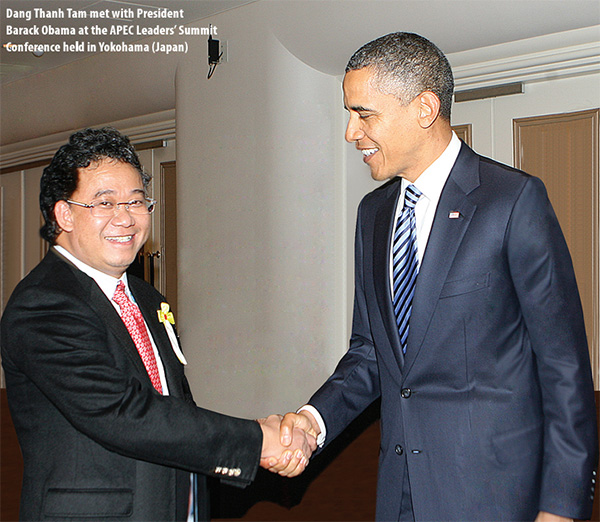 Dang Thanh Tam, chairman of Kinh Bac City Development Corporation is one of few people lucky enough to meet more than one US president. His cherished memories of these encounters will stay with him for the rest of his life.
Dang Thanh Tam, chairman of Kinh Bac City Development Corporation is one of few people lucky enough to meet more than one US president. His cherished memories of these encounters will stay with him for the rest of his life.

Tam met with former President George W. Bush and President Barack Obama on separate occasions where he discussed with them pressing issues at the Asia-Pacific Economic Co-operation (APEC) Forum. On the agenda were diverse topics including climate change, food security, trade facilitation, financial flow, cross-border labour issues, and borderless travelling. Looking back on these meetings, Tam recalls that President Obama had a strong personality and conducted himself discreetly, while President Bush struck him as someone with a very easy-going spirit.
Born and raised during the war between Vietnam and the US, Tam acknowledges that although the US was once the country’s rival, time has done much to heal the wounds of war. In fact, relations between the two nations have flourished to the point where they have now entered a comprehensive partnership.
On November 20, 2006, former President Bush met with five Vietnamese business leaders in Ho Chi Minh City. Asides from Tam himself, other attendees included FPT Group chairman Truong Gia Binh, Refrigeration Electrical Engineering Corporation chairman Nguyen Thi Mai Thanh, AA Interior Design Furniture Corporation CEO Nguyen Quoc Khanh, and Toan My Trading Corporation CEO Le Thi Phuong Thuy.
During their discussions, Tam raised a valid point with Bush: “The relationship between Vietnam and the US has been normalised, and the two sides will become partners. As president, what will you do to promote economic ties deserving of these new political relations? After all, good political rapport is meaningless without the promotion of economic relations that can bring about benefits to the people of both countries.”
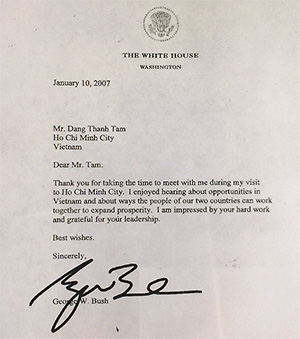
After the meeting, President Bush responded to Tam in a personal letter, “I enjoyed hearing about opportunities in Vietnam and about ways the people of our two countries can work together to expand prosperity. I am impressed by your hard work and grateful for your leadership.”
Bush’s message has slowly become a reality, reaching a landmark point when the Trans-Pacific Trade (TPP) pact was signed at the beginning of 2016. This free trade agreement is aimed at raising trade and investment between the signatory members – a list that includes Vietnam, the US, and ten other countries. According to Tam, trade agreements like the TPP, the European Union-Vietnam Free Trade Agreement, and the recent formation of ASEAN Economic Community (AEC) offer a crucial advantage to businesses like Kinh Bac City Development Corporation (KBC).
As a pioneer in the construction and development of industrial parks in the country, Tam and his associates have laid a solid foundation for the growth of KBC. In roughly 20 years managing and steering the industrial park segment, he has proven his capabilities through his very own industrial park business model. KBC is now one of the first preferences among foreign direct investors when investing in Vietnam.
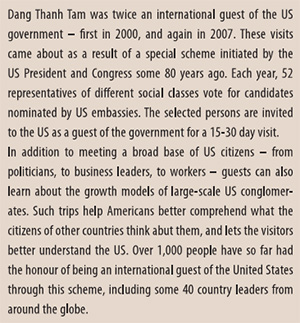
The company’s access to a large land bank in several prime locations is evidence of KBC’s strength in this sector. The land bank has a total of 4,500 hectares for industrial park development and 1,300 hectares for urban and residential development. Of this, 2,500 hectares are directly owned by KBC and its subsidiaries.
In addition, KBC has developed a diversified product range that meets even the most stringent customer requirements. Aiming to place customer interests first, the company always strives to cater for the specific needs of its investors. With some 14 industrial parks across the nation, the company is in the lead position in terms of attracting large-scale foreign direct investment (FDI), with some of the big name players including Canon, Foxconn, and LG.
KBC’s operation and maintenance of infrastructure within the industrial zones is very efficient, with well preserved landscapes and clean surroundings. Also highly regarded by its tenants are KBC’s and its partners’ supporting financial services, as well as security, and other utilities that facilitate a closed and convenient supply chain.
These strengths are the secrets to KBC’s success in drawing investment into its six industrial parks, two of which have an occupancy rate of between 95-99 per cent. Notably, KBC’s customers are mostly foreign enterprises (some 90 per cent).
In a bid to draw in small- and medium-sized satellite businesses of large-scale corporations, KBC has developed the sale and lease segment in office and factory spaces. This shortens the time required for businesses to commence operation, while reducing the investment risk.
“Each factory premises covers a standard area of 5,000 sq.m, as well as offices and ideal facilities to help investors hit the ground running. These products are in great demand at present,” shared Tam.
KBC has also strengthened its panel of leaders and staff, extolling competence and responsibility as core virtues. For several years in a row the company has received a governmental award in recognition of its stellar performance in attracting FDI. “So far, we have received 15 leading awards from the government,” noted the KBC leader, revealing no small measure of pride in his company’s achievements.
KBC has drawn upon all its strengths and resources to come up with products that can attract more FDI into Vietnam in 2016. In particular, US investors are being courted as an important target market.
Industrial parks, such as Que Vo, Trang Due, and Tan Phu Trung have become familiar names among investors, and the upcoming Trang Due II, Nam Son Hap Linh, and Quang Chau Industrial Parks will soon be added to that list.
KBC also plans to expand its land bank for the special economic zone (700 hectares) at Haiphong Industrial Zone, while simultaneously developing potential industrial zones in central and southern Vietnam.
